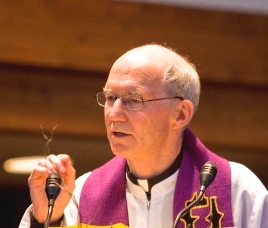Let me explain. You may have noticed how each Sunday we three Bible readings: First from the Hebrew Scriptures, the Old Testament, followed by a Psalm; second a New Testament reading from a letter of Paul, James or Peter; third a selection from the Gospel. The Gospel takes primacy because it recounts the teachings and miracles of Jesus as well as his passion, death and resurrection. For that reason a priest or deacon usually preaches on the Gospel - using the Old Testament reading to show the broader context. For example, today we hear about Jesus overthrowing Satan. Well, how did Satan get into the driver's seat? The Old Testament readings describes Satan deceiving our Mother Eve and bringing calamity on the human race.
So it's logical for a preacher to focus on the Gospel. The second reading gets sidelined. Although understandable, we lose some of the riches of God's Word. This summer we have sequential readings from two important letters: Second Corinthians and Ephesians. These communities matter a lot to St. Paul. He spent eighteen months in Corinth and three years in Ephesus. The letters have a message that will help us grow in faith and in our relationship with Jesus.
For Paul Jesus means everything. A young man with impressive achievement as a zealous Jewish scholar, he meets Jesus and all that changes. What he valued before seems like so much ashes in comparison. Or to put it more exactly - all previous learning matters only in so far as it relates to Jesus. Paul is a coherent man, a man of integrity in a world of empty show. We'll see that as we study and pray over Second Corinthians and Ephesians.
Today we hear a recurring theme: thanksgiving - gratitude for grace. Grace means God's free gift of himself. That gratitude keeps Paul from getting discouraged. He's grateful even in afflictions - and Paul had plenty. He'll give us a short list this summer. These affliction, says Paul, produce an eternal weight of glory. He speaks about how when the earthly dwelling is destroyed - when our bodies are folded up like a tent - we have an eternal dwelling in heaven.
This does not mean to look down on our bodies. No, because of Jesus' resurrection we place value on the human body - even after death. That's why the Catholic Church desires each Christian to have a funeral with body present. In the case of cremation I encourage the family to have the body present for the funeral. I've actually loaned my casket to families for a loved one's funeral. Three families have taken me up: Maggie Beatte, Sheila Ascherl and most recently Kurt Biderbost. I would be happy to have others use it before I take up permanent residence. In this life our bodies are temples of the Holy Spirit through baptism. They receive the anointing oil of confirmation and the sacrament of the sick. Jesus nourishes our bodies with his Body and Blood - the Eucharist.
So Paul says that even though our outer self wastes away, God renews our inner self. Our bodies rely on a very complex code called DNA. It defines us. Just so you and I have an inner self that determines what we will become on the day of the resurrection. Our outer self, says Paul, is wasting away while our inner self is being renewed day by day.
There's more to come on this. Next week we'll learn what Paul means when he says "we walk by faith, not by sight..." It will shed light on what we learned today - that we have to thank God even in times of difficulty. The afflictions we suffer can bring inner renewal. Begin with gratitude; end with gratitude. The goal of our summer, to quote Paul, is to allow "thanksgiving to overflow to the glory of God." Amen.

 RSS Feed
RSS Feed
